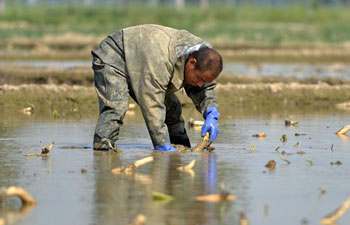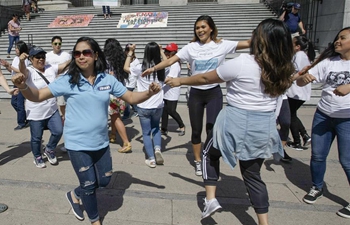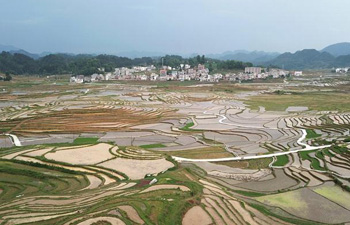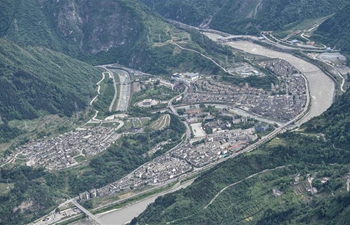y Murad Abdu
ADEN, Yemen, May 14 (Xinhua) -- The holy fasting month of Ramadan, a festal season of spirituality and a joyful occasion, will start throughout the Muslim world on Wednesday.
In the Muslim countries, people are eagerly waiting for Ramadan which is considered as an opportunity for unifying all the family members under one roof.
But in the war-torn impoverished Arab country Yemen, thousands of people are going to receive this Ramadan amid despair and harsh living conditions as a result of the three-year long military conflict that started in 2015 and is still raging across the country.
Families usually have to specify a private budget for Ramadan because the expenses increase and more food is consumed throughout this month.
Salah Gamil, 58, failed to prepare for Ramadan because he did not receive monthly salary that is necessary for him to go shopping early and buy food items.
"This Ramadan looks joyless because I'm a government employee but without salary and couldn't buy the food items for my children," Gamil told Xinhua.
"I really got fed up with waiting for several hours in front of the exchange company, but received no money in the end," Salah said.
Many other people in the southern port city of Aden were not fully satisfied because of the the sharp increase of basic commodities prices in shopping centers.
According to Yemeni economists and analysts, the food prices sharply increased between 35 percent and 100 percent in the recent months of 2018, compared with the period before the Saudi-led military intervention against the Shiite Houthi rebels in 2015.
"The burden of skyrocketing prices made our life very difficult by adding more woes. Everything is too expensive," Hani Saeed, a high school teacher, told Xinhua.
"My salary is not sufficient to buy all the needed commodities and I am obligated to exclude many food items that I couldn't afford to buy," Saeed said.
The persistent depreciation of the Yemeni Riyal against the other foreign currencies including the U.S. dollar, losing about 225 percent of its pre-crisis value, added another suffering to people's life.
Hilal Hutaibi, an owner of a wholesale business company, told Xinhua "this month we canceled our plan for importing new goods from other countries due to the rapid depreciation of the national currency, high cost of transportation and the double customs taxation."
"Local markets in Aden and others provinces are experiencing a severe shortage of essential goods required by the citizens," Hutaibi said.
Many people in Aden complained bitterly about the complete absence of supervision from the Saudi Arabia-backed Yemeni government which is based in their city.
Fatima Nasser, a housewife in Aden's neighborhood Mansourah, told Xinhua that "the shopping centers and the groceries are filled with fake and contaminated food products because the trade officials are in deep sleep."
"The owners of supermarkets and big traders also exploit the absence of the government to increase the product prices in an unbelievable way and as much as they like," Nasser said.
She added by saying that "the voice of the citizens is totally ignored in this country and our suffering is getting worse day by day."
During the month of Ramadan, Muslims all over the world abstain from eating and drinking from dawn to dusk.
Immediately after sunset, families, neighbors and friends share the usually delicate Iftar meals to break their fast together in one place.
But for Musa Ahmed, a father of 8 children who escaped the war in Taiz province to live in Aden, this Ramadan will remind him of his eldest son who was killed in the ongoing war last year but his memory lives on.
"Some fathers will not have a complete happiness during Ramadan because they lost their beloved sons during the war and I'm one of those sad and unlucky fathers," Ahmed said.
"I used to live in dignity with all my sons gathered around me during the Iftar meal in Ramadan. But this Ramadan one of my beloved sons won't be present with us because he left forever," he told Xinhua, with eyes filling with tears.
Unemployment and poverty have been severely hurting most of the Yemenis.
According to the United Nations, more than 22 million people in Yemen require humanitarian aid or protection assistance, including 2 million who are internally displaced due to the ongoing conflict between the government and Houthi rebel forces.
During Ramadan, Muslim communities also engage in acts of charity. Mosques receive most of its funding during this month.
Akram Basha, an Aden-based citizen, said that "only during Ramadan all the charity organizations race for distributing aids and help the poor people to overcome their pains and poverty. But after Ramadan definitely poor people will be left alone."
The month of Ramadan would end with the festival of Eid al-Fitr.

















